
by John P. Pratt
Sun 18 Sep 2016, 1 Jehoiarib (P), 1 Autumn (E)
©2016 by John P. Pratt. All rights Reserved.
Some scholars and researchers have questioned whether or not it is indeed appropriate for followers of Jesus Christ to keep Sunday as the holy day on which to worship. While most Christian sects observe the traditional Sunday day of rest, some have switched to either another day of the week (such as the Seventh-day Adventists worshipping on Saturday) or more recently to a "lunar sabbath" which can fall on any weekday and is determined by the phases of the moon.[1]
 |
Before reviewing the sacred calendar witnesses, let's first look at the integrity of the week itself, its tie to the Hebrew Calendar, and traditional scriptural support for Sunday worship.
Before deciding on a day of the week for worshipping God based on both revelation and historical evidence, let us answer one of the first questions that comes up. If the week is indeed a sacred unit of time and if worshipping on a certain day of that week is important to God, then it seems fair to ask "Is the day we call Sunday the same as the first day of the week on which the early Christians met to break bread and worship?"
The short answer to that question is "Yes, Sunday today is the same as Sunday at the time of Christ!" The 7-day week has been an uninterrupted day count since long before Christ. Its continuity dates back to the time when the Israelites returned from their captivity in Babylon.
The weekly cycle is part of the Gregorian Calendar which is used today throughout the world. Technically it is a separate cycle of 7 days, but it is incorporated into that calendar. In 1582 when the former Julian Calendar was upgraded to be more accurate, Pope Gregory XIII had the good sense not to interfere at all with the 7-day week. The day after Thu 4 Oct 1582 was Fri 15 Oct 1582. There were arguments about how much rent was due for that month because ten days were skipped, but there could be no squabble about what day was Sunday because the week had not been touched. That is, Thursday was followed by Friday. The weekly cycle can be thought of as an entirely separate calendar by itself, as will be discussed in the section on the Priest Calendar.
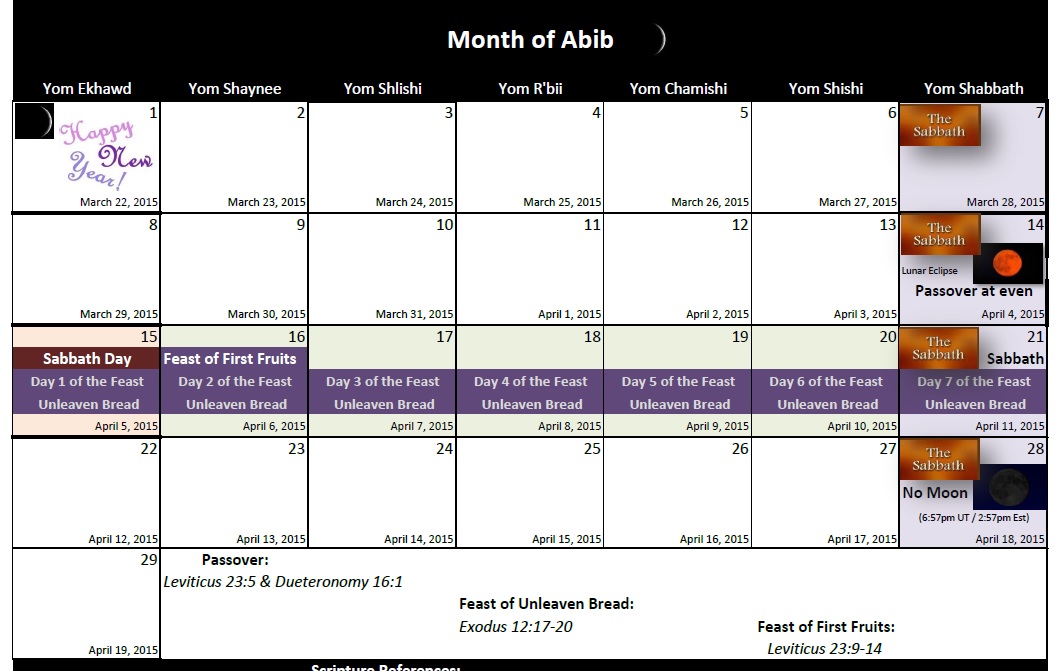 |
That was one lesson the Jews learned well and the entire Christian world also has been blessed thereby. Ever since their return from that exile, they have tenaciously kept the 7-day week intact. There have been many attempts to change it, such as communist Russia attempting to change to a five day week and the socialist French Revolution opting for a 10-day week as in ancient Egypt. In fact, one of the witnesses of the sacredness of the week is the blatant effort of satanic regimes to destroy it. Severe punishments were often executed on those attempting to maintain the 7-day week count after it became illegal to use. In these two cases, Christians as well as Jews fought to keep the 7-day count intact and sometimes suffered death by so doing. We should not be surprised in the upcoming reign of the Antichrist if the week is outlawed in a similar fashion. Hopefully we will know enough to fight to preserve it!
What thank we the Jews for having preserved the week so diligently since the sixth century B.C. (2 Nephi 29:4)? That gift to all the world is seldom acknowledged, but it is priceless both for religious worship and historical accuracy.
At the time of the Exodus, when the children of Israel were led by Moses from slavery in Egypt, there is no evidence that they had any knowledge of the concept of a continuous 7-day week cycle. In the account in Genesis of the time of Adam to Abraham, Isaac and Jacob, no reference to weekly worship comes to mind. The Egyptians used a 10-day week (decan). So if the Lord wanted the freed Israelites to begin to worship on every seventh day, how could He train a whole generation to so do and really emphasize its importance?
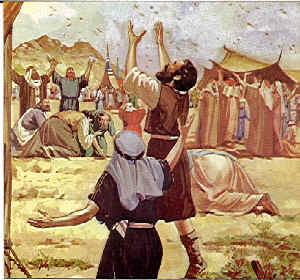 |
That continued for forty years!! Would that help you to believe in God, and that He would provide for you, and that you were indeed supposed to keep every seventh day holy? In those forty years all but two of the former generation died, but the younger generation had received a powerful lesson on the sabbath day and the goodness of Jehovah.
The obvious point for this discussion is that nothing at all is mentioned about the moon in this record. The manna skipped its appearance on every seventh day. For those who believe in chance coincidences, it is easy to believe that for perhaps a few weeks in a row that a natural phenomenon could "just happen" to drop sustaining food every day but the seventh, but the probably of that happening for forty years straight is so small that atheists are forced to reject the Biblical account out of hand. That simply could not happen by chance.
So what was the first day on which the manna appeared? Was it on a Sunday, the first day of our week? If so, that would make the seventh day, the sabbath, a Saturday. The Biblical account implies that the manna was first seen on the 16th day of the second month of the Exodus (Exo. 16:1,12), which my research indicates was Sun 10 May 1462 BC.[2] If so, then the first day of the week back then matches Sunday, the first day of the week today, and the Jewish sabbath fell on Saturday just as it does today!
Just to complete the story, after three weeks of gathering and eating the manna the Lord gave the Ten Commandments, which include keeping the sabbath day holy. By that time they would have understood what the "sabbath day" meant: it was the day of rest on which no manna appeared in the morning.
Those advocating a lunar sabbath imply that it was used in the law of Moses. None of the papers I've read on that subject mention the forty years of sabbath training establishing the weekly cycle given at the time of Moses. Instead the authors base conclusions on a few scriptures that say that the first day of every lunar month (new moon) was a sabbath day. Yes, it is true that the first day of every month was a holy day of rest, but that does not mean it was the weekly sabbath day! In the Bible new moons, other holy days, and weekly sabbaths are all called "sabbath" days because sabbath means "rest". That has led to much confusion, including the supposed basis of the lunar sabbath theory. To me the entire theory of lunar sabbaths is without any firm scriptural foundation whatsoever.
Just for the record, while this 40-year account clearly shows that the Hebrew Sabbath came every seventh day from the time of Moses onward, it does not prove anything about if and how any sabbath day was observed before Moses. The account in Genesis of the creation of the earth implies that the Lord kept the sabbath and rested on the seventh "day" of creation, but no evidence in the Bible known to me suggests that it was kept before Moses.[3] Thus, this evidence does not rule out the possibility of a lunar sabbath being observed before Moses. On the other hand, there is absolutely no scriptural evidence known to me that such was ever observed. As shown in what follows, it is indeed clear that the Lord has used a 7-day sacred week all the way back to Adam and continues to use it to this day. The extra-Biblical Book of Enoch implies that the week was known to Enoch as a unit of time.
When Jesus appeared to the Nephites after His resurrection and after He repeated to them the Sermon on the Mount, He explained that the law of Moses had been fulfilled (3 Nephi 15:4). All of the detailed rites and ordinances that were performed on the holy days of the calendar given to Moses were no longer required. For many this concept was earthshaking because these rituals had been performed for nearly 1,500 years, since the time of Moses. Indeed one of the main reasons Jesus was crucified as an imposter was that He had the audacity to replace the entire law of Moses with His new higher law given in the Sermon on the Mount.
Many of the Nephites understood that the only purpose of the law of Moses was to bring people to Christ, however, thus they may not have been surprised at the bold new teaching. They had anticipated this day because they knew that was the purpose of the law and said that they had continued to obey that law (Jarom 1:11) but it was dead unto them because they had already come unto Christ (2 Nephi 25:25). They knew that it should only be kept until the Savior appeared to them (Alma 25:15, Alma 30:3).
Was or was not the Saturday sabbath part of the law of Moses? It is almost universally taught that keeping the sabbath day holy transcends the law of Moses and is still in force today. Let's consider that teaching carefully to see the foundation upon which it rests.
The commandment to keep the sabbath (seventh) day holy was one of the Ten Commandments. While it is generally assumed that all of the Ten Commandments are still in force today, let us examine that teaching carefully also.
A scripture search to find anywhere that Jesus taught to keep the seventh day holy after the Resurrection yields no success. Even though many of the Ten Commandments are upgraded to higher laws in the Sermon on the Mount (Matt. 5:21, 27), keeping the sabbath day is not mentioned at all! In fact, the Sermon on the Mount entirely replaced the law of Moses with a new and higher law (3 Nephi 12:19-20).
When the rich man asked Jesus what commandments he should keep, several of the Ten Commandments were mentioned, but keeping the sabbath day was not mentioned (Luke 18:20). And in modern day revelation when the "law of the Church" was given to Mormons although most of the Ten Commandments were given anew, no mention was made of keeping the sabbath day holy (D&C 42:18-21)! It is usually assumed that because the Lord quoted some of the Ten Commandments that all of them were implied. But we must be cautious in making assumptions because He is so careful with commandments.
Was this just an oversight on the part of the Lord? Did He forget to include one of the Ten Commandments in the new law given to His latter-day restored church? This question is answered below in the section on latter-day revelation.
The second main reason that some Christians worship on Saturday is that it is assumed that the commandment to keep the sabbath day holy is still in force because Israel was commanded to "observe the sabbath throughout their generations, for a perpetual covenant" (Exo. 31:13,16). This is the principal reason that the Seventh-day Adventists keep Saturday as the weekly sabbath. They interpret that scripture that it not just a day of rest to be kept, but always the seventh day. The word "sabbath" comes from the Hebrew meaning "rest". To keep a holy day of rest indeed appears to be a perpetual covenant with the Lord. But Jesus said that He is "Lord of the sabbath" (Mark 2:28) and He has commanded that different days be the day of rest to different people and/or at different times.[4]
A brief discussion of the names of the days of the week may be worthwhile. In most countries, the names of the weekdays come from the names of the seven visible "planets" known to the ancients: the sun, moon, and five visible planets of Mercury, Venus, Mars, Jupiter and Saturn. In English, some of the names are similar to English: Sunday (Sun day) and Monday (Moon day) and Saturday (Saturn day). The others are from the Norse names of the gods/planets: Tuesday (Mars, Tyr's day), Wednesday (Mercury, Wodan's day), Thursday (Jupiter, Thor's Day and Friday (Frigg's Day).
 |
These names are generally associated with pagan gods and hence there have been efforts to change these names by Hebrews and Christians alike. In the New Testament, the day we call Sunday is called the "first day of the week" (Matt. 28:1; Mark 16:2; Luke 24:1; John 20:1.) The last day of the week (our Saturday) is called the sabbath and the day preceding (our Friday) is called "the preparation", meaning the preparation for the sabbath. All four gospels agree that Jesus was crucified on a Friday (See Matt. 27:62; Mark 15:42; Luke 23:54; John 19:42), although modern scholars and those unable to find three days and three nights between Friday and Sunday twist this simple meaning to be "preparation for the Passover" which has no historical foundation. In the year of Christ's crucifixion the preparation (Friday) happened to fall on the day of preparation for the Passover on which the lambs are sacrificed, which has contributed to the confusion about that date.
One successful effort to replace the pagan names was accomplished in Portugal by the Catholic Church in medieval times. Sunday was renamed "the Lord's day" following the traditional name for Sunday from the early Church (Rev. 1:10). The Portuguese translation of "Lord's day" is "domingo". The name for Saturday became "sabado", meaning sabbath. The other days are simply numbered, with Monday being the second day of the week.
I served an LDS mission in Brazil (Portuguese) and really loved the names of the days of the week. Church members knew that the Hebrew sabbath was on Saturday because that was their name for the day. Sunday was the Lord's day; there was no confusion about that. I never heard anyone teach there that Christians worship on the seventh day of the week as I have often heard from uninformed LDS speakers. It is important to understand that the sabbath day of the Old Testament was on Saturday.
There is not a lot of scriptural support for the sabbath day having been changed from Saturday to Sunday after the Resurrection. It is mostly tradition, but as will be shown, there is compelling evidence that it is a correct tradition.
There are two principal New Testament references which indicate that the apostles revered the first day of the week (Sunday) as the new holy day of rest. The first indicates that the day on which the apostles celebrated the sacrament of the Lord's Supper was on the first day of the week. The term for that sacrament was "to break bread". In Acts 20:7 it is recorded: "And upon the first day of the week, when the disciples came together to break bread".
Although that is an isolated verse it still preserves an important tradition. The very apostles of Jesus Christ worshipped on the day we call Sunday. It is almost inconceivable that they would get the day wrong, especially after the Savior personally taught them for forty days after the Resurrection (Acts 1:3).
Another important verse is in Revelation where the Apostle John refers to Sunday as "the Lord's day" (Rev. 1:10), which has already been mentioned as the basis for the Portuguese upgrade of the weekday names. At the time that was a Christian name for Sunday which would have been as easily understood by his readers as the word "domingo" would be for modern Portuguese readers. Sunday is the Lord's day. Below we will see that even in our day and age, the Lord seems to prefer "the Lord's day" for the first day of the week over the name "Sunday".
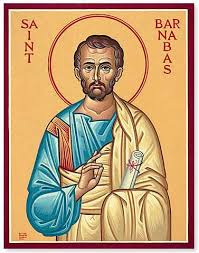 |
Barnabas explains that the old sabbath was symbolic of how the earth was created in six days and the Lord rested on the seventh. He says that the history of the earth mimics those seven days, with each day representing a thousand years. At the end of 6,000 years the earth will rest for 1,000 years during the Millennium. But then he adds that even as Christ resurrected on the eighth day of the week (being Sunday, the same as the first day), even so will the earth be renewed at the beginning of the eighth thousand years. And finally he states that is why they worship on [Sunday] because that was the day of the Resurrection (Barnabas 13:3-5, 9-10).[6]
For Latter-day Saints (Mormons) and others who believe in the Lord's revelations to Joseph Smith, a definitive answer has been given. It is only found in one latter-day revelation to him. There are many times when the Lord does not repeat himself to make a point. We are supposed to live by every word which proceeds from His lips (D&C 84:44) without requiring endless repetition.
On Sunday 7 Aug 1831 the Lord revealed to the Prophet Joseph Smith the following amidst a long list of commandments to be kept:
And that thou mayest more fully keep thyself unspotted from the world, thou shalt go to the house of prayer and offer up thy sacraments upon my holy day;
For verily this is a day appointed unto you to rest from your labors, and to pay thy devotions unto the Most High;
Nevertheless thy vows shall be offered up in righteousness on all days and at all times;
But remember that on this, the Lord's day, thou shalt offer thine oblations and thy sacraments unto the Most High, confessing thy sins unto thy brethren, and before the Lord.
And on this day thou shalt do none other thing, only let thy food be prepared with singleness of heart that thy fasting may be perfect, or, in other words, that thy joy may be full. — D&C 59:9-13 (emphasis added).
This lengthy commandment describes in detail how to keep Sunday, the Lord's day, as the official day of rest and of meeting and partaking of the sacrament of the Lord's Supper. Sometimes this crystal clear commandment is overlooked or misunderstood because the Lord does refer to the day as "Sunday". The Prophet knew what day it was and recorded it. The Lord refers to the day once as "my holy day", once as "the Lord's day" (using the New Testament name already discussed), and three times as "this day". It is hard to imagine how He could have made it any more clear without actually using the name "Sunday." The fact that the pagan name is so obviously avoided in a context where it would have really helped us to understand, suggests that He prefers the New Testament name for His holy day.
Thus, independent of all of the reasoning used to denounce Sunday worship as a false tradition, at this time Sunday truly appears to be the day on which Christians should be worshipping and keeping as a day of rest. To me, this revelation alone is compelling as an unambiguous declaration of the Lord's will.
Now let us turn to multiple other witnesses of the sacredness of Sunday as testified by holy days on several sacred calendars.
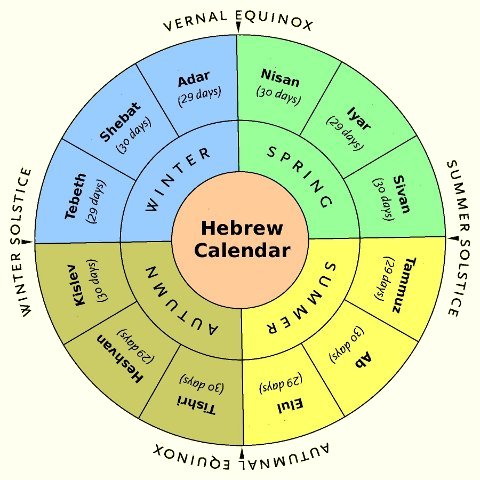 |
The day of the Waving of the Omer is specified to fall on Sunday. It is explicitly stated that it should be offered on the morning following the sabbath day during Passover week (Lev. 23:11).[7] That barley offering represented the firstfruits of the ground in the spring.
The resurrection of Jesus Christ occurred on the Sunday during Passover week. The apostle Paul pointed out that the offering of the firstfruits of the ground clearly referred to the Resurrection: "But now is Christ risen from the dead, and become the firstfruits of them that slept" (1 Cor. 15:20). Thus, no matter what day of the week Passover began on, the offering of the firstfruits from the ground always was to occur on the following Sunday. In my work, it got tiring always to call this day the Waving of the Omer and then have to explain that it is really the "Hebrew Easter" and nearly always coincides with the Christian Easter Sunday. Thus, in my later articles this day is simply called the Hebrew Easter day. That might be doubly offensive because it is using a pagan name for a Christian concept on the Hebrew calendar, but it sure makes it easy to understand what is meant.
Exactly seven weeks after the Waving of the Omer, a major holy day occurred called the Feast of Weeks, the Feast of Firstfruits (of wheat) or Pentecost (Lev. 23:15-16). Thus, that holy day was also designed always to occur on a Sunday. Those are the only two annual holy days which always were to occur on the same day of the week. Thus, Sunday was important even though it was not the weekly sabbath.
There was another calendar in the Hebrew religion called in my work the Priest Calendar. It is usually thought of only as a cycle rather than a calendar but in practice they are the same. It is the cycle of 24 weeks during which priestly families took turns serving in the holy temple. The order of the families (and hence the names of the weeks) was determined during the reign of King David (1 Chron. 24:7-18), but the cycle was begun only at the dedication of the temple under the reign of King Solomon.
That cycle of 168 days (24 weeks) is made into the Priest Calendar simply by extending the count forward and back throughout history. Doing so has been very fruitful to testify that sacred events have often occurred on its holy day.
The holy day on the Priest Calendar begins at noon every Saturday when the priest from the next family begins to preside for the next week. That holy day ended the next day at noon on Sunday. Thus, the holy day was partly on Saturday and partly on Sunday. It is like an average between the Hebrew sabbath day and the Christian Lord's day. To me, it is still being used with holy events occurring both on Saturday afternoon and Sunday morning. Keeping this priestly day count precise was one way that the week was kept perfectly without ever inadvertently skipping a day.
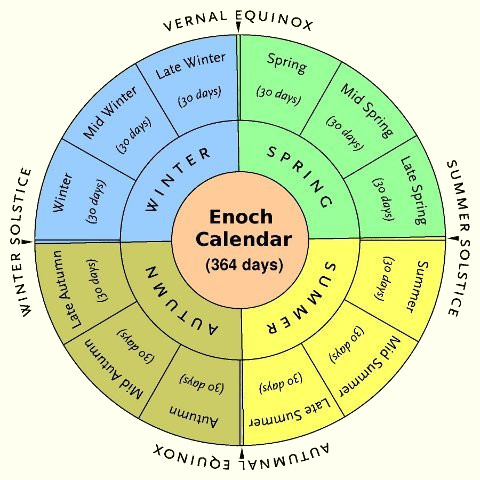 |
On this calendar the holy days occur on fixed dates of the year. As with the Hebrew Calendar, both Easter and the Feast of Firstfruits (Pentecost) always occur on Sunday.
The related Jubilee Calendar also has a 364-day year, but it is divided into 7 parts of 49 days each and three extra holy weeks. The first day of each of those ten divisions is a holy day which always falls on a Sunday.
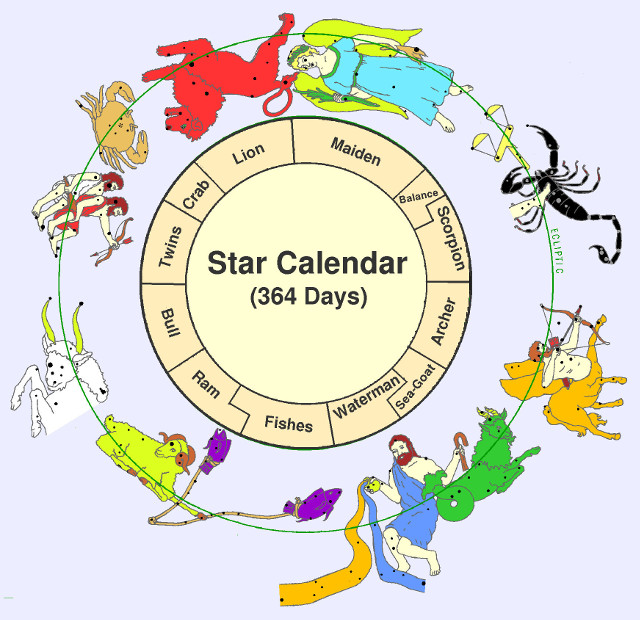 |
Thus it is seen that on several of the sacred calendars, several holy days always fall on a Sunday. As shown on the Religious Chronology page of my website, many significant religious events from Adam through the present have occurred on holy days which were designed always to occur on a Sunday. The date of the publication of this article falls on the morning of the first day of the Priest cycle (1 Jehoiabrib) and also on the first day of Autumn on the Enoch Calendar (1 Autumn), both of which always fall on Sunday.
The evidence for Sunday being the correct day of worship for Christians is compelling. It was the day of worship of the early Christians and the weekly cycle has been kept intact since that time. It is also the day on which modern revelation to the Mormon prophet Joseph Smith commands us to worship God. And finally, several sacred calendars are designed based on the week and have many of their holy days always fall of Sunday. These calendars confirm the other witnesses that Sunday is a holy day indeed and the correct day for Christians to worship God.